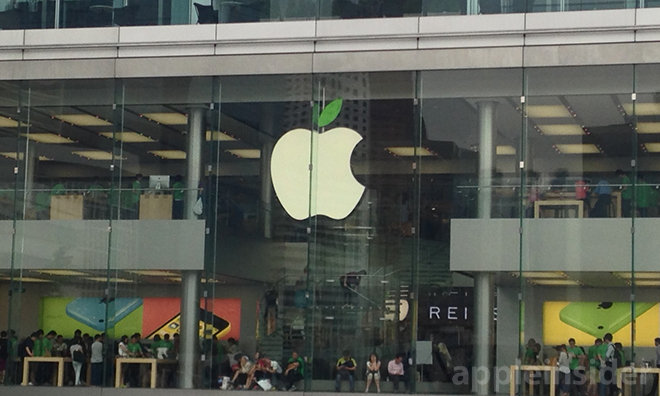Apple's head of environmental efforts, Lisa Jackson, addressed a variety of issues, including the company's relationship with federal regulators and its global carbon footprint, in a new interview.
Jackson spoke at Wall Street Journal's "Eco:nomics" conference last week, and addressed a question on whether federal politics are becoming more or less important to Apple. In response, she said that while "in no way" does she want Washington to believe it isn't relevant to the company, Apple "owes something back" in the form of applying its innovation to clean energy and resource efficiency.
Jackson also argued that a private sector example makes it easier for federal policy makers to believe it's possible to be profitable while still being environmentally responsible.
She did however suggest she feels regulations are "constraining innovation" in some respects, using the example of removable batteries. The batteries in most Apple products are non-removable, which makes the devices harder to reuse, and the batteries more difficult to recycle.
"Our products get smaller and smaller and smaller. There's a huge efficiency of resources there. So before you tell me that we need to be able to remove a battery or you decide what makes sense in terms of how we build our products, let's understand the life-cycle impact," she said.
On the topic of Apple's carbon footprint, Jackson asserted that with the company's First Solar deal, all of its US facilities will be fully powered by renewable energy. Ball observed that Apple's US operations account for just 2 percent of its carbon footprint, but Jackson countered by saying that 70 percent of the company's footprint is linked to "facilities that don't have the Apple logo outside," and that another 22 percent is generated by customers.
"We take responsibility for that because one, we can drive the number pretty well with energy efficiency," she claimed, touting the new 12-inch MacBook as the "most efficient" notebook available. "When we make a change like that and then we sell hundreds of millions of product, that actually adds up." The second reason is that Apple believes it's the "right thing to do," according to Jackson, since people buying a device are inherently contributing to carbon emissions.
Jackson admitted that in the last 10 years, Apple has had little influence on the 70 percent of its footprint outside its direct control. This includes manufacturers and suppliers, some of whom are scattered across the world in countries such as China, Japan, and Indonesia.
 Roger Fingas
Roger Fingas

-m.jpg)






 Marko Zivkovic
Marko Zivkovic
 Mike Wuerthele
Mike Wuerthele
 Christine McKee
Christine McKee
 Amber Neely
Amber Neely
 Wesley Hilliard
Wesley Hilliard

 William Gallagher
William Gallagher










8 Comments
My name is Lisa... "Miss Jackson" if you're environmentally nasty.
"
"
There's an oxymoron.
"She did however suggest she feels regulations are "constraining innovation" in some respects, using the example of removable batteries. The batteries in most Apple products are non-removable, which makes the devices harder to reuse, and the batteries more difficult to recycle." Yup. Is 'difficult' becoming easier to ascribe to Macs? One thing I find I am scratching my head over is claims of sustainability with annual MacOS 'upgrade' cycles ie: 1 year active support and mere 3 year 'extended' support that seems to apply to security and printer updates only...? By way of example I have a perfectly good HP DesignJet plotter I paid $2000 for and was shipping actively in 2007. It is only on its 3rd set of cartridges as it is infrequently used - much work being digital now. I finally was essentially forced to upgrade from trusty Snow Leopard this year due to sunsets for 'innovation' in core software applications, and the MacMare began... This massive plotter that is in mint condition and perfectly mechanically functional has no drivers past Mountain Lion for MacOS? Is it now disposable? Must I forgo software innovation to use a substantial investment both financially & in embodied energy in this beautiful, functional plotter? Must I choose between a new (more energy efficient) Mac & my plotter? Ironically it has Windows drivers for W7/8, so by the Microsoft website policy this plotter should be perfectly functional and supported for another decade or so (2023 ) in Windows, but is already obsolete for Macs? Windows 7pro also has support for XP, so if Windows 10pro presumably has some kind of legacy support for Windows 8, this may be good for well longer than a decade more in what was past described as 'Plug & Pray' environment...??? Should 'Plug & Pray' now describe MacOS? How is MacOS "sustainable" with this kind of driver upgrade pressure not unreasonably prompting short term driver support sunsets & associated hardware obsolescence...? This seems a real problem on many, many levels...? I can assure you it feels like a very, very crappy user experience, and has cost me countless hours of 'inefficiency'...
"
There's an oxymoron.
...only when morons write the regs